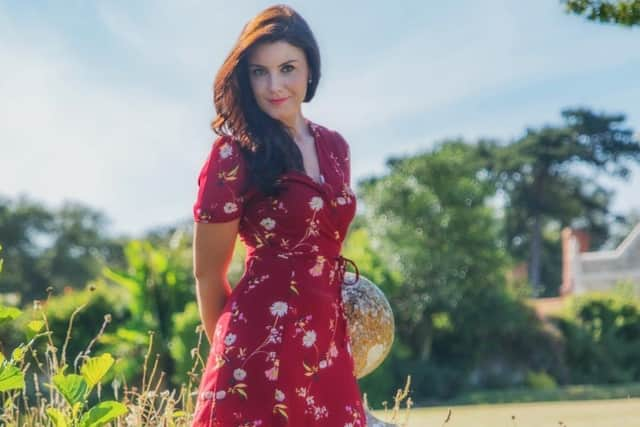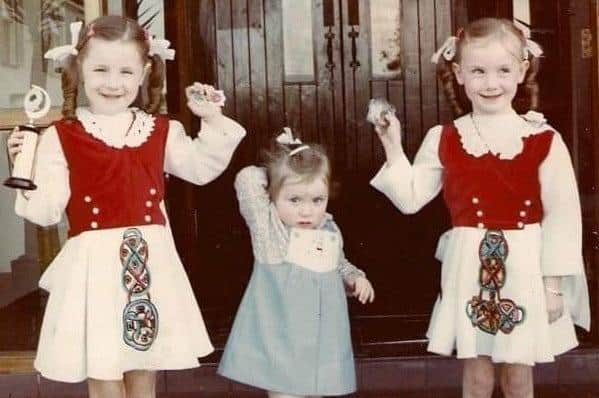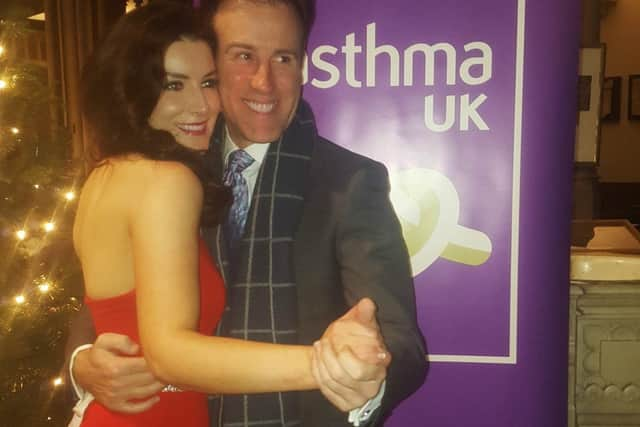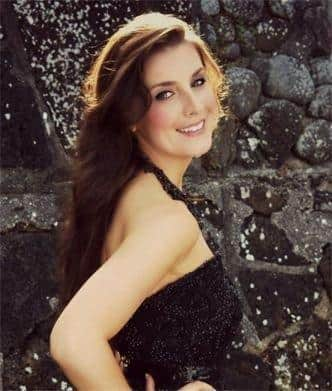Margaret Keys: ‘The world has enjoyed what has come from the stage of Derry Feis’


The Derry soprano has also worked with globally recognised producers including Sir Andrew Llyod Webber and her repertoire of musical theatre credits include ‘My Fair Lady’, ‘Les Miserables’, ‘Mary Poppins’, ‘Carousel’, ‘Beauty and the Beast’ and ‘Phantom of the Opera’.
Margaret has also performed in front of 35,000 people at the famed Rotura Lakeside Concert in New Zealand and after a performance at the National Concert Hall in Dublin she was signed by Universal Records. She has also appeared at the Royal Albert Hall, Carnegie Hall, the London Palladium and toured with Alfie Boe, Russell Watson, Paul Potts and the Welsh Fron Male Voice Choir. Her first studio album ‘Legato’ reached number 14 and her album ‘The Gift of Music’ went straight to the top of the Official Classical and Classicfm charts when it was released in 2018.
Advertisement
Hide AdAdvertisement
Hide AdAged 15, Margaret was awarded the Trinity College of Music London Medal for best overall singer in her music examinations and also holds a Master’s degree in Singing and Performance from the Royal Scottish Academy of Music and Drama.
“I was four when I started singing with James MacCafferty at his home in Francis Street. Everybody in our house sang at the feis. They all sang, but none of them sang professionally. My maternal grandmother, Margaret Clifford was very good. When she was 16 she won the Deanna Durbin competition – a vocal competition run throughout Ireland.
“Johnny Logan’s father, Patrick O’Hagan came second. She married very young and had a family of 12. That generation didn’t know where to go next. They didn’t really know there were music colleges. Getting on a plane wasn’t as easy then as it is now, so she got married and had a family. But she sang and she sang at anything - at any family parties and she was really good.
“When I was born I lived next door to my grandparents and any music that they played was that classical or light classical music from the old musical films. I think I just really fell in love with that type of music because that’s what I had been hearing. I thought this is really good and then they would have come to see me at the feis and other competitions. They were really supportive.
Advertisement
Hide AdAdvertisement
Hide Ad“My father’s family weren’t musical. There wasn’t that side to them. But, once I started to sing he liked it, so he went to every competition. Then I started to do really well and then he wanted to see how far I could go.


“Obviously, my family worried that it wasn’t a career that was very safe. I remember my grandfather sitting me down and saying ‘you are good enough but be sensible too’. So I travelled up and down to Dublin twice a week to Irene Sandford at the Royal Irish Academy of Music as I trained to be a school teacher at St Mary’s College in Belfast.
“I kept the music up while I was a student and the day I graduated from St Mary’s I got an offer from the Royal Scottish Academy to go and study there. I didn’t even really get to teach, I just went straight to Scotland first and then to London. Derry Feis was the catalyst for it all to be honest,” Margaret said.
Even though her first appearance at Feis Doire Colmcille was as a very young child, Margaret remembers the first songs she performed there and how one of the initial performances resulted in what must have seemed a highly unlikely victory.
Advertisement
Hide AdAdvertisement
Hide Ad“My first Irish song was ‘Ding Dong Clog Na Scolie’ and the second was ‘My Wee White Pup’. I think children are still singing that now.


“There were also definite rituals associated with Derry Feis. I am a twin, so we got ready together and learned the songs together, so that was helpful. Rosemary, was and still is a total perfectionist. She would have known the song the week after James MacCafferty taught it to us, but I was a drama queen and added bits in. Rosemary would have sung the song exactly the way it should be, but I would have dramatised it. I never learned the Irish song properly but she would have had it perfected.
“I remember thinking the night before the feis, ‘God, this isn’t going to work, but it’ll be grand. I’ll go up on stage and Rosemary will mouth me the words – she’ll help me out.’ Rosemary sang it note and word perfect. She has a beautiful, lovely, sweet voice. We were about six. I looked down at her but she stayed tight-lipped the whole way through. So I just made the words up. The judge came on at the end and he started by saying….‘lovely singing today’. Rosemary came second and I thought this was fantastic.
“And then the judge said, ‘I’d like to award this one to a performer who I felt, even though at six years of age, she was able to show stage craft, and although she got it wrong, she convinced me that it was correct. This can happen sometimes, you can go blank sometimes and that’s when stage craft will get you through.’
Advertisement
Hide AdAdvertisement
Hide Ad“I won it and you can imagine our house that day. Rosemary was delighted for me though. So that’s the story from Derry Feis that I will always remember,” Margaret said.


The Derry singer is also convinced that progress through the age groups at the feis provided a natural learning curve and the desire to watch, learn and improve as the years went on. Performance venues at Derry Feis also had a definitive status. As you got older, the arena changed and they had a significance linked directly to a seniority that had to be earned as time passed.
“When we were younger we spent a lot of time in the Rialto. You went to the Minor Hall and the Guildhall’s main hall when you reached the senior competitions. You wanted to get to that point. I always remember thinking, ‘God I can’t wait until I’m in an over 16 competition’.
“I remember going to the night sessions at the feis and watching the adult competitions being inspired by what I heard. I loved hearing people singing in different languages and hearing the musical theatre songs. You had your competitions as a child during the day and then mum brought you down at night with your Easter egg and into the Minor Hall, or in to see the dancing in the big hall. But I always wanted to go to the Minor Hall to hear the singing.
Advertisement
Hide AdAdvertisement
Hide Ad“Derry Feis had a process to it. You started young and watched the older ones and couldn’t wait to be that age. It was almost like you wished your life away. Also, you started off winning medals and then you were in the over 12 age group and started winning the odd cup and then at 16 you were singing at night time and that was a big deal.
“So I think that process made you want to see the end goal. So, you stayed at it because you knew that’s where you wanted to be. You wanted to end up in that Minor Hall with that cup in your hand. And, of course, your photograph taken by the Derry Journal. I always remembered that. If you didn’t get first you didn’t get your photograph taken. It was something that made you work harder. You knew if you won you got your photograph in the paper. If you were second or third, you had no chance,” Margaret laughed.
“It wasn’t just a process of moving from medals to cups though, it was also a learning process. You moved on to singing songs in a different language or within a single competition you might have had to sing three or four songs. You also had to speak in between each of those songs and present them. So, everything gradually got harder and was a bit more of a challenge. It really was a good grounding for what I am doing now obviously.
“To be honest I think it was a different type of stage craft at Derry Feis and I think that’s what the music academies I went to later liked.
Advertisement
Hide AdAdvertisement
Hide Ad“There were people that were in my year – there’s just eight singers chosen each year– and there were only two from Northern Ireland. The rest were from America, Russia and the Czech Republic. It was very international. So, when you audition you have to present yourself and be able to speak and sing in different languages and be of the same quality throughout. Everybody had that experience, so you knew that you had to have something else on top of all that.
“It wasn’t a matter of ‘oh, I did the Derry Feis,’ but what I do believe held me in good stead was the endearing qualities that Derry Feis allowed me to have. It was the genuineness. I wasn’t coming from a stage craft school where everything was a bit more false and everything was ‘jazz hands’.
“At the feis you were singing Herbert Hughes or Thomas Moore songs with real, juicy lyrics that you had to get to the bottom of. So when I presented them it was a genuine interpretation and I do remember them saying that to me – that there’s a real, true side to your singing. We believe you when you’re singing.
“I think the Derry Feis and my teacher and my grandparents definitely made that happen. I remember learning things like ‘Sweet Sixteen’ and asking well, what does that song mean? I was inquisitive about it because I didn’t really understand it. So they would all say well that’s a love song - a song of heartbreak. So at the age of 19 whenever I went for auditions that was the one thing that I learned and it was like a stage craft. It was almost at times hard to watch. Sometimes it’s almost too much, too showy. It was the genuine side that they enjoyed at the academies.
Advertisement
Hide AdAdvertisement
Hide Ad“I also think that it’s something in us as a people and I think that’s very important, especially in our industry because it’s very hard to come across. It’s hard to find in performers, producers, agent or any aspect of direction. It’s hard to find that genuineness.
“I have been in the industry around 15 years and I have found that. There is a way to filter the other side out but when you find the real thing I can instantly see it now. At the start it was harder because you didn’t really know what they wanted. You wonder about who you are signing up with, but I think when I went to college from the Derry Feis I think they saw a side that was just truer and more natural.
“I think that’s something that Derry people have, and I am not being biased, I just think we have a more natural and purer talent that’s not forced.
“Even going to England or America now you can see a more natural way about not just Derry people but Irish people and performers.”
Advertisement
Hide AdAdvertisement
Hide AdThe ‘Journal’ also asked Margaret about how important she feels the feis was and is as a launching pad for a career in the arts?
She said: “It is absolutely important, because what else was there for us? Apart from school shows, there wasn’t really anything else.
“There wasn’t another stage that you could sing on. It was something that you practised all year for.”
“You did your grades and examinations, but that was under one examiner who gave you a mark out of 100, but that went nowhere. To have that platform and to have that audience, whether they were on your side or not that doesn’t matter, they had their child there – that was the element of competition and that’s how you learn about competition,” added Margaret.
Advertisement
Hide AdAdvertisement
Hide Ad“When I was at music college, I did sing in competitions. I was never a huge fan of them, but I did them. Then you move on to auditions and you’re faced with a record label or a manager and auditioning for them and so you think back to what you had to do when you walked up to perform at six or seven years old in the Guildhall. There was an audience there. They weren’t representing a record label or a West End agent but they had their opinion and it was an important one.
“I would definitely say that Derry Feis has made an impact not just in Derry, but think about the amount of competitors that have come through the feis who are now known internationally. They have mostly graced the Derry Feis at one point or another whether that was for five minutes, five years or 15 years. The effect has been international because of the talent. Culturally, whether it’s dancing, whether it’s traditional music or classical music the world has been allowed to enjoy what has come from the stage and through the doors of Derry Feis.
“The feis has definitely been good for Derry, good for me, performers in the city and those who have made their way across the world. So let’s keep Derry Feis for as long as we can.”